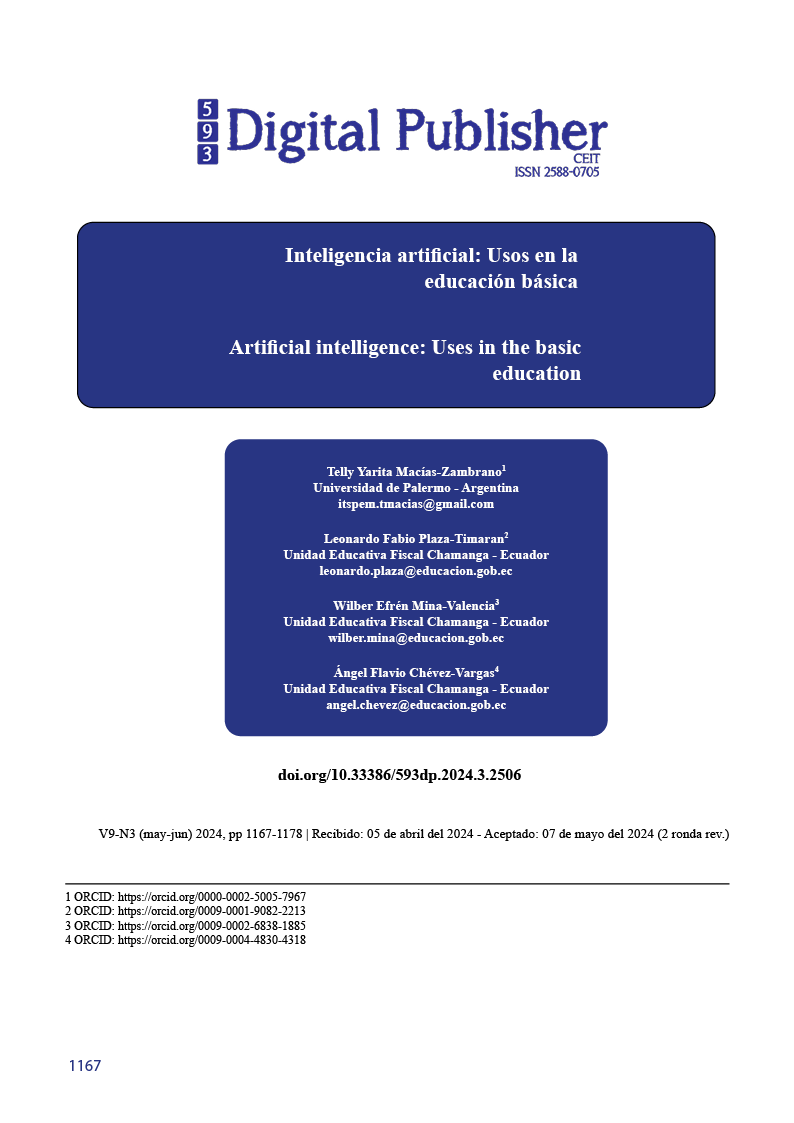Artificial intelligence: Uses in the basic education
Main Article Content
Abstract
Artificial intelligence can mimic human capabilities to provide information that facilitates the development of some activities. The objective of the study was to determine the implementation of artificial intelligence as an educational resource in the Ernesto Vera Cedeño Educational Unit of Rocafuerte canton. The methodology used was a mixed approach, non-experimental design of descriptive level, the application of interview and survey techniques to a non-probabilistic intentional sample of 15 teachers, whose inclusion criteria required being a teacher of second to seventh year of general basic education, 2 years in the institution and their consent to answer the questionnaire, the interview to a professional, the documentary review and the analytical method to support the discussion. As results, 93% of teachers who use artificial intelligence to support the teaching-learning process in activities such as tutoring, monitoring and questionnaires, achieving time savings in class preparation, administrative activities and obtaining ideas for planning, benefits such as support in personalized educational content, inspiration to prepare classes. Concluding that it is the human mind that has the capacity of discernment that artificial intelligence systems do not have, although they can simulate them, being essential that the teacher corroborates the information provided to use it as a support resource for the exercise of teaching-learning, without neglecting the exercise of his mind continuously, in a positive way for all educational actors.
Downloads
Article Details

This work is licensed under a Creative Commons Attribution-NonCommercial-ShareAlike 4.0 International License.
1. Derechos de autor
Las obras que se publican en 593 Digital Publisher CEIT están sujetas a los siguientes términos:
1.1. 593 Digital Publisher CEIT, conserva los derechos patrimoniales (copyright) de las obras publicadas, favorece y permite la reutilización de las mismas bajo la licencia Licencia Creative Commons 4.0 de Reconocimiento-NoComercial-CompartirIgual 4.0, por lo cual se pueden copiar, usar, difundir, transmitir y exponer públicamente, siempre que:
1.1.a. Se cite la autoría y fuente original de su publicación (revista, editorial, URL).
1.1.b. No se usen para fines comerciales u onerosos.
1.1.c. Se mencione la existencia y especificaciones de esta licencia de uso.
References
Archenti, N. (2012). El sondeo. Metodología de las ciencias sociales. Cengage. http://metodologiadelainvestigacion.sociales.uba.ar/wp-content/uploads/sites/117/2019/03/Cuaderno-N-7-La-t%C3%A9cnica-de-encuesta.pdf.
Bates, A. (2019). Teaching in a Digital Age. Second Edition. Tony Bates Associates Ltd. https://www.dawsoncollege.qc.ca/faculty-hub/wp-content/uploads/sites/182/Teaching-in-a-Digital-Age-Second-Edition.pdf.
Cejas, M. (12 de marzo de 2024). Beneficios de la implementación de la IA como recurso educativo. (L. Pin, Entrevistador)
Chassignol, M. (2018). Artificial Intelligence trends in education: a narrative overview. Procedia Computer Science, 3(3), 12 - 22. https://downloads.editoracientifica.com.br/articles/230513147.pdf.
Del Mastro, C. (2013). Enseñanza estratégica en un entorno virtual: un estudio sobre la formación de tutores en educación continua [Tesis Doctoral]. Universidad Autónoma de Barcelona. https://ddd.uab.cat/record/37892.
Feria, H., Blanco, M., & Valledor, R. (2019). La dimensión metodológica del diseño de la investigación científica. Académica Universitaria.
García, D. (2019). Avances de la inteligencia artificial en salud. Dominio de las Ciencias, 5(3), 603-613. https://repositori.uji.es/xmlui/bitstream/handle/10234/195263/TFM_2021_Mac%C3%ADas%20Moles_Yovanna.pdf?sequence=1.
Gómez, W. (2023). La Inteligencia Artificial y su Incidencia en la Educación: Transformando el Aprendizaje para el Siglo XXI. Revista Internacional de Pedagogía e Innovación Educativa, 3(2), 217-229. https://editic.net/ripie/index.php/ripie/article/view/133.
González, C. (2011). Sistemas tutores inteligentes: propuesta de una arquitectura para aprendizaje en salud pública. VII Congreso Iberoamericano de Informática Educativa. https://www.researchgate.net/publication/372053496_La_Inteligencia_Artificial_y_su_Incidencia_en_la_Educacion_Transformando_el_Aprendizaje_para_el_Siglo_XXI.
González, C. (2023). El impacto de la Inteligencia Artificial en la educación transformación de la forma de enseñar y de aprender. Qurriculum: Revista de Teoría, Investigación y Práctica Educativa, 36(21), 50-60. https://dialnet.unirioja.es/servlet/articulo?codigo=9033695.
Hernández, R., Fernández, C., & Baptista, P. (2014). Metodología de la investigación, 6ta edición. Mc Graw Hill. https://www.esup.edu.pe/wp-content/uploads/2020/12/2.%20Hernandez,%20Fernandez%20y%20Baptista-Metodolog%C3%ADa%20Investigacion%20Cientifica%206ta%20ed.pdf.
Jara, I. (2020). Usos y efectos de la Inteligencia Artificial en educación. Banco Interamericano de Desarrollo. https://www.researchgate.net/publication/372053496_La_Inteligencia_Artificial_y_su_Incidencia_en_la_Educacion_Transformando_el_Aprendizaje_para_el_sSiglo_XXI.
Lobo, L. (2019). Artificial intelligence and medicine. revista BRasileiRa de Educação Médica, 41(2), 1–19. https://doi.org/http://dx.doi.org/10.1590/1981-52712015v41n2esp.
Lucena, F. (2019). Artificial Intelligence in Higher Education: A Bibliometric Study on its Impact in the Scientific Literature. Education Sciences, 4(2), 23-40. https://downloads.editoracientifica.com.br/articles/230513147.pdf.
Luckin, R. (2018). Machine Learning and Human Intelligence: The Future of Education in the 21st Century. EDUCATE VENTURES. https://www.educateventures.com/.
Macías, T. (2021). Una visión ancestral a los saberes montuvios de la campiña manabita Experiencias Parte I. Grupo Compás. http://142.93.18.15:8080/jspui/handle/123456789/725.
Moreno, R. (2019). La llegada de la inteligencia artificial a la educación. Revista de Investigación en Tecnologías de la Información: RITI, 7(14), 260- 270. https://repositori.uji.es/xmlui/bitstream/handle/10234/195263/TFM_2021_Mac%C3%ADas%20Moles_YovannA.pdf?sequence=1.
Ocaña, Y. (2019). Artificial Intelligence and its Implications in Higher Education. Purposes and Representations, 7(2), 536–552. https://doi.org/http://dx.doi.org/10.20511/pyr2019.v7n2.274.
Ospina, J. (2021). Aplicación de inteligencia artificial y técnicas de aprendizaje automático para la evaluación de la susceptibilidad por movimientos en masa. Revista Mexicana de Ciencias Geológicas, 38(1), 45- 54. https://doi.org/10.22201/cgeo.20072902e.2021.1.1605.
Parra, J. (2022). Potencialidades de la Inteligencia Artificial en Educación Superior: Un Enfoque desde la Personalización. Revista Tecnológica-Educativa Docentes 2.0, 14(1), 12- 32. https://doi.org/10.37843/rted.v14i1.296.
Peñaherrera, W., Cunuhay, W., Nata, D., & Moreira, L. (2022). Implementación de la Inteligencia Artificial (IA) como Recurso Educativo. RECIMUNDO, 6(2), 402-413. https://doi.org/10.26820/recimundo/6.(2).abr.2022.402-413.
Reales, J., Robalino, G., Peñafiel, A., Cárdenas, J., & Cantuña, P. (2022). El Muestreo Intencional No Probabilístico como herramienta de la investigación científica en carreras de Ciencias de la salud. Revista Universidad y Sociedad, 14(S5), 681-691. doi:https://rus.ucf.edu.cu/index.php/rus/article/view/3338
Ronquillo, K. (2023). La inteligencia artificial aplicada en la innovación educativa en el proceso de enseñanza y aprendizaje. LATAM Revista Latinoamericana de Ciencias Sociales y Humanidades, 4(2), 1597-1613. http://latam.redilat.org/index.php/lt/article/view/706.
Rubeira, A. (2008). Introducción a la Metodología de la Investigación. Shalom.
Torras, M. (2018). Fundamentos y práctica del aprendizaje adaptativo. Universidad Internacional de Valencia. https://www.researchgate.net/publication/330412526_Fundamentos_y_practica_del_aprendizaje_adaptativo.
Vera, F. (2023). Integración de la Inteligencia Artificial en la Educación superior: Desafíos y oportunidades. Revista Electrónica Transformar, 4(1), 17–34. https://www.revistatransformar.cl/index.php/transformar/article/view/84.
Wang, P. (2018). Chao: a framework for the development of orchestration technologies for technology-enhanced learning activities using tablets in classrooms. International Journal of Technology Enhance Learning, 10 (12), 1-21. https://doi.org/10.1504/IJTEL.2018.10008583.


